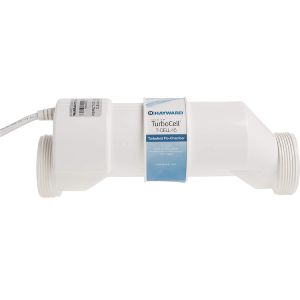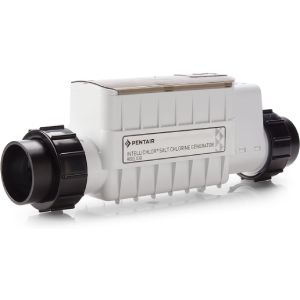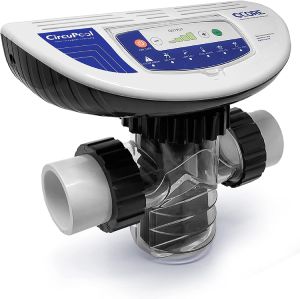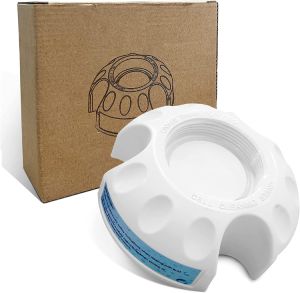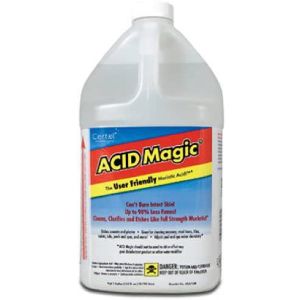- Salt Water Pool and Spa
- Salt Water Pool Systems
- Salt Water Pool Cell
Salt Water Pool Cell
A salt water pool cell or chlorine generator is what converts pool salt into low levels of bacteria fighting chlorine by breaking down the salt molecules. The cell is part of a salt water system that often includes a control panel where it can be monitored and programmed to produce a desired level of chlorine depending on demand. In some models the controls are located directly on the cell itself and don't require a control panel for operation. The process of creating chlorine naturally from salt present in the pool water is the same regardless of the type you choose.
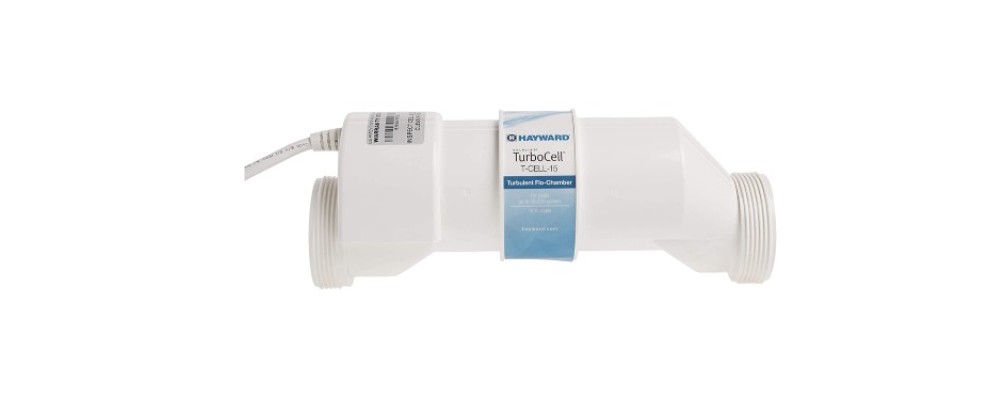
Automatic chlorination technology has been around for decades but it wasn't until recently that it became affordable and eventually mass produces for residential pool owners around the world. It's estimated that over 2 million pool owners have switched to salt water instead of chemical chlorine in the last 25 years. This switch is likely due to the many benefits including less pool maintenance, reduced operating costs and of course the silky soft water.
Top Rated Salt Water Pool Cells
A salt water pool cell is the heart of any salt water system and is relied on to keep your pool water healthy. The top manufacturers in the pool industry have spent years perfecting chlorination technology and have created reliable products that will perform year after year and most are backed by multi-year warranties. When combined with a high purity pool salt you can count on endless free chlorine and a lot less headaches balancing your pool chemistry.
1. Hayward T-Cell Turbo Cell
The Hayward T-Cell Turbo Cell Series is our top rated electrolytic cell for salt systems because it simply is the best unit based on performance and overall quality. It is certified by the National Sanitation Foundation and backed by a 3 year warranty. These units are available in 3 sizes for inground pools; 15,000, 25,000 and 40,000 gallons as well as units designed specifically for above ground salt water pools. These high quality chlorine generator cells are compatible with all Hayward Goldline systems.
It's important to match the model number of your salt system to the appropriate chlorine generator to ensure compatibility as the fittings have changed slightly over the years.
Hayward TurboCell Salt Water Pool Chlorinator T-Cell-15 for Pools up to 40,000 GallonsIf you click on this link and make a purchase, we may earn a commission. |
2. Pentair IntelliChlor Cell System
The Pentair IntelliChlor chlorine generator is an all-in-one salt water system that works independently and doesn't require a control panel. All of the automated chlorine features are operated by push button on the unit itself. It's available in 3 sizes; 20,000, 40,000 and 60,000 gallons for inground pools. The automation controls include production settings, hours of operation, chlorine output, cleaning cycles and salt content reading.
Pentair IntelliChlor IC40 Chlorine Generator Cell for Pools up to 40,000 GallonsIf you click on this link and make a purchase, we may earn a commission. |
3. CircuPool Chlorinator System
The CircuPool chlorinator system is arguably the easiest to use and most user friendly salt water system on the market. It's rated for use for pools up to 35,000 gallons. This chlorine generator cell has all the features you'll ever need on a handy control panel with an intuitive interface and precision controls. The handy automatic polarity reversal helps reduce calcium buildup so you won't have to clean the cell as often.
CircuPool Salt Water Chlorine System for Pools up to 35,000 GallonsIf you click on this link and make a purchase, we may earn a commission. |
Salt Water Pool Cell Cleaning
The salt water pool cell works by performing a rather simple natural process of electrolysis where it separates the sodium and the chlorine molecules of salt as it passes over titanium plates within the cell. This creates chlorine and subsequently healthy and bacteria fighting pool water that will keep your pool clean and inviting all season long. The chlorine that is naturally produced further breaks down into hypochlorous acid and hypochlorite ions that both work to break down the structure of microorganisms and bacteria.
Keeping your salt level within recommended range, ORP in check and other chemicals balanced will help ensure the cell works optimally and will prevent scale buildup that can form when a pool is out of balance. In the event that the cell does need cleaning we've put together a step-by-step process to follow when cleaning and maintaining your salt water pool cell. We've also listed our top rated pool cells that are available on the market today based on performance, longevity and overall quality.
A cell will require cleaning at least once a season but if your pool is not balanced properly it can be required more often. It's recommended that you check your cell every 2 to 3 months until you have a good grasp on the system and balancing. Most systems have a built in monitor that will notify when the cell needs to be inspected similar to the check oil gauge on your vehicle. It's usually set to be checked every 400 to 500 operating hours. There are some great products available that will help you automate your pool including chemistry adjustments.
In some models you will find a self-cleaning feature that cleans the cell while the system is running. This feature is a definite positive but we still recommend checking the cell periodically to ensure the plates are free of scale or build up and other mineral deposits that can develop on the titanium plates over time. As these minerals build up the cell loses its effectiveness to convert chlorine so it’s important to ensure the cell stays as clean as possible all season long.
The steps below will help ensure that you clean and maintain the salt water pool cell properly which will extend the operating life of the cell and keep your pool clean and healthy.
Blue Works Salt Cell Cleaning Stand for Hayward CellsIf you click on this link and make a purchase, we may earn a commission. |
Pool Cell Cleaning Basics
- Turn off the power to the cell before removing and inspecting.
- Inspect the plates within the cell to see if any lightly coloured crusty or flakey scale deposits have formed. There may also be debris that has caught on the plates as water passes through. If there aren't any deposits you can reinstall the cell.
- The first and easiest way to get the scale off is to use a high pressure hose but if this doesn't work we recommend using a plastic or wooden tool to scrape the stubborn deposits off. You should not use anything metal as this can damage the plates.
- If pressure washing and scraping do not remove the majority of the deposits you will need to use a mild acid wash, a cell cleaner or call a pool professional.
Cleaning a Pool Cell with Muriatic Acid
- Turn off the power to the cell and remove it from plumbing.
- In a clean container mix a 5:1 solution of 5 parts water and 1 part muriatic acid. Always add acid to water and never add water to acid. Rubber gloves and eye protection should be worn at all times in case of splashing or contact. Muriatic acid and chlorine should never be mixed as it will create a gas that could be deadly if inhaled.
- The level of the acid solution should be level with the top of the cell making sure that the wire harness and compartment aren't in the water.
- Remove as much of the deposits as possible before soaking for best results from the acid solution.
- Let the cell soak for 5-10 minutes and then rinse with a garden hose.
- If any deposits are still visible you should repeat the soaking process. As long as you still see foaming on the blades during soaking you still have calcium deposits and further soaking is necessary and beneficial.
- Once the cell is clean you can reinstall, turn the power back on and reset the system cell inspection feature if necessary.
If your salt water pool cell comes with an acid washing kit please refer to the instructions provided. A kit will make the task of cleaning a bit easier and and safer when working with muriatic acid. A cell cleaning stand that will allow for easier cleaning, most stands will include an o-ring or seal that will prevent leakage from the bottom of the cell.
Certol International Muriatic Acid 1 Gallon ContainerIf you click on this link and make a purchase, we may earn a commission. |
The cell should be cleaned at the end of every pool season and stored inside if you experience freezing temperatures. If you leave the cell outside make sure that there is no water in the system as this can damage the cell. If you would like more information about end of season maintenance for your salt water pool you can read our pool closing page.
Replacing a Salt Water Cell
A salt water pool cell will need to be replaced roughly every 3-5 years. The plates wear out and no longer convert chlorine adequately. You will notice your chlorine levels dropping and possibly cloudy water that indicates the cell is no longer working. Salt cell replacement involves turning the power off, removing the plugs and unthreading the cell the same as during cleaning. We recommend replacing with the same brand of cell you are currently using to ensure compatibility with your existing system.
If you found that your chlorine production was adequate and you were happy with the cell you should replace with the same gallonage rating. If you were constantly fighting to keep chlorine production high enough especially during increased pool usage and high temperatures we recommend upgrading to a larger cell. If you're considering converting your pool to salt water we hope this information has helped.
Disclaimer
Please use all appropriate and proper safety precautions when attempting projects on this website. All projects are attempted at the reader's own risk.
Salt Water Pool and Spa™ participates in the Amazon Services LLC Associates Program, as an Amazon Associate we may earn a commission from qualifying purchases.
